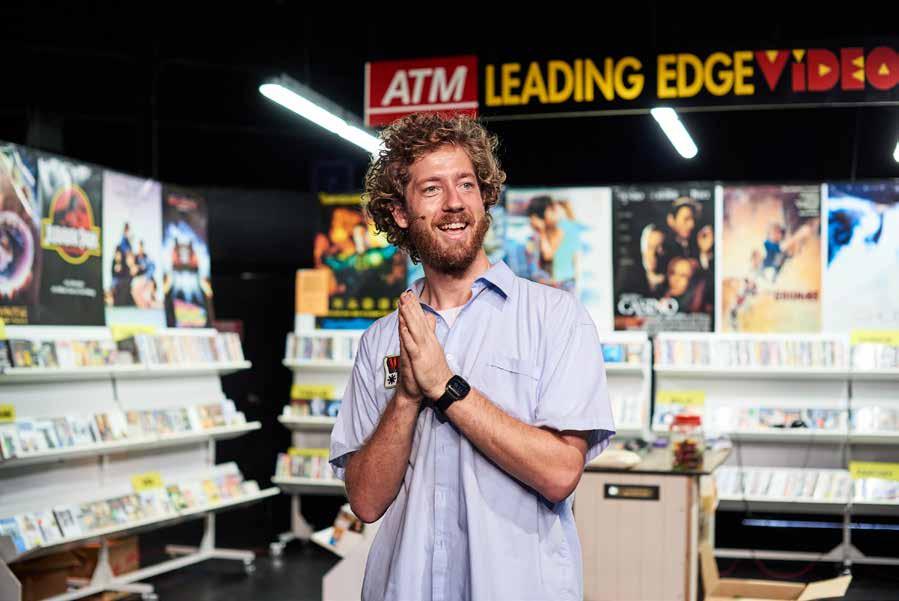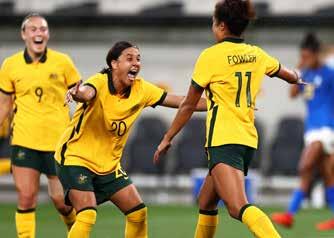
6 minute read
Bondi Counselling Services
Come along to your local Resident Precinct Meeting
Precincts are meetings of residents who get together regularly to discuss local matters or issues of concern in their neighbourhood. Waverley is split into 13 Precincts and meetings are open to any person living within the Precinct boundaries.
This September and October, the following meetings are on:
Vaucluse / Diamond Bay – Thursday 21 September, 7
9pm
Bondi Beach – Monday 9 October, 7 – 8.30pm
Bondi Heights – Monday 9 October, 7 – 9pm
Charing Cross – Wednesday 11 October, 7 – 9pm
Bronte Beach – Wednesday 18 October, 7.30 –9.30pm
North Bondi – Wednesday 25 October, 7 – 9pm Rose Bay – Monday 30 October, 7 – 9pm
What’s in a Game?
We all know that sporting events are so much more than just humans competing against each other. For at least three thousand years, people have engaged in competitive sports for self-enjoyment, entertainment and even preparation for warfare. At the individual and community level, a game of sport provides a rich variety of opportunities ranging from improved fitness to the galvanising of community spirit and pride. At the macro, national and international level, a game of sports can even influence global politics. The physical, psychological, sociological and political implications of a sporting match can be truly amazing.
I have always been a sport-focussed person. I love my rugby, surf life saving and other physical activities. After a long day in parliament, when it is too late to join a sporting team, I will walk the streets of the Coogee electorate, but I love my competitive sports the most. During COVID I came to understand even more how important sport is to our community. So many people expressed the sense of loss and isolation they experienced when we were cut off from our sporting teams and events.
How fortunate are we that there are so many sporting games now occurring in the East, in Sydney and around Australia? How fantastic has it been to see so many local residents, including those from the Irish diaspora, show their colours in our East? It has not been difficult to get caught up in football fever with Australia and New Zealand hosting the FIFA Women’s World Cup and the many games being played locally. In reflecting on how phenomenal our Matildas are and how far women’s sport has advanced, I think it is fitting that we reflect on where the sport has come from.
The history books tell us that women’s football has been played in Australia as far back as the 1920s, however the first Australian women’s team was established in 1978 to take part in the first World Women’s Invitational Tournament in Chinese Taipei. The team of 1978 were not paid and they had to pay their own way, with many a chook raffle and lamington drive to assist in raising funds. While our international football team continued to play throughout the ‘80s, it wasn’t until the introduction of the FIFA Women’s World Cup and women’s football at the Olympic Games in the 1990s, combined with a surge in participation levels throughout the country, that renewed interest was sparked in the national women’s team, now known as the Commonwealth Bank Matildas.
It’s important to remember that these women played on in the face of sexism while fighting for recognition, validation and respect within the sport. Our Matildas continue to be vocal about equal prize money. During the 2019 FIFA Women’s World Cup the Matildas climbed to fourth on the world stage, captivating audiences, reaching the knockout stages and outperforming the Socceroos. While the Socceroos failed to win a single match, they received $8 million for simply qualifying while our Matildas received just $1 million. The overall prize pool for the women in the 2023 World Cup is $110 million, while the prize pool for the men was $440 million. While this is three times more than what was allocated in 2019, the women still only receive 25 per cent of what the men get. So, while we have come a long way, there is still much to do. Play on.
I love the Matildas and I am so grateful that we can enjoy their wins and their losses. I see that there is a surge of young women passing a ball around their school playing fields and I feel so much joy.




Postcards From Remote Sumatra
These past two months I took it upon myself to take a swift hiatus in the wave and fish rich regions of remote Sumatra. With all the hype of scoring perfect barrelling waves and catching exotic fish there seemed no better location to visit. I had a seven-week canvas to work with and four different locations to hit along the way, giving me plenty of time for waves and fish while immersing myself in the Indo culture. Armed with a plentiful five-surfboard quiver, a robust box of lures and fishing rod, along with a few pairs of boardies, Indonesia was my oyster.
I began my travels on an island known intimately by thousands of Aussies - Bali. The surfing bug took over and I surfed hard for ten days with no time for any fishing. Over a few cliffside Bintangs at Uluwatu, I listened in on a cracking yarn about a local Indonesian surfer and fisherman. This particular bloke was known to routinely paddle out on his surfboard through the famous Uluwatu lineup with his fishing rod to catch fish for his family. He also happened to be a semi-professional surfer and a well respected and equally feared Uluwatu local. On one particular day he lucked out on a handful of fish and strung them to some cord around his waist like he normal- ly would. When going to paddle his catch back in, the wave of the day loomed in the distance and, just like any self respecting surfer would, he turned and paddled for it, pulling straight in to a six-foot barrel with his fishing rod in one hand and a string of fish hanging off his body before racing the section and straightening out over the reef back to the caves to walk up the cliff. Aussie core lord and Bali resident Bobby recited the story to me, saying that it was ‘the single greatest thing’ he had ever seen. I couldn’t help but think something like that would have to be the pinnacle of my life.
Sunburnt and surfed out, I left Bali for South Sumatra, thankful for having dodged the dreaded Bali belly and keen to uncover the true colours of Indonesia beyond the chaos of Bali. South Sumatra’s Krui was the next stop and we arrived after an arduous seven-hour taxi ride, with five surfers and twenty surfboards stuffed into a very ill-equipped car. We were cooked by the time we arrived. I was woken at 5am by the call to prayer thundering through loudspeakers, which was novel at first but quickly became the bane of my existence after hearing it five times a day. We spent the next week screaming around on scooters with local legend and filmer Nana chasing waves along the coast. On multiple occasions I witnessed the locals bring in huge sailfish on their small wooden boats, whetting my appetite for some fishing.
The Mentawais was the next and most highly anticipated stop on the trip. The ‘Ments’ are widely regarded as the Mecca of the surfing world, with most keen surfers making the pilgrimage there at the very least once in their life. We locked in a threeweek stake-out on a remote island where we lived with a local surfer, Hibear, in his home. The area boasted a plethora of world class waves, pristine jungle and aqua blue water. Being so remote, any sort of protein came at a premium and, as a result, the servings were conservative to say the least. Once the swell dropped after a few days I decided to take matters into my own hands and catch some fish to supplement our meals. Starting out shorebased, my efforts were fruitless and I knew I needed to get out into deeper water for a better chance.
Taking inspiration from the story of the Uluwatu core lord, I paddled out from the beach on my longest surfboard with my rod tucked into my boardies and headed for the reef’s edge. The fishing offered a handful of small cod that confidently smashed my lure, most likely having never seen one before. Eventually I hooked onto a better sized fish that surfaced as a small emperor with good eating prospects. Back on the beach, I heard whistling and screaming and saw that I was providing some entertainment for the Aussie crew over their arvo beers. I dispatched and bled the fish as I sat on my board trying not to think of the sharks that I would be attracting and paddled for the beach where Ballina local Jade threw me a cold Bintang like some sort of medal for my efforts. That night we enjoyed a hearty fish curry and I felt a sense of resourceful satisfaction.






